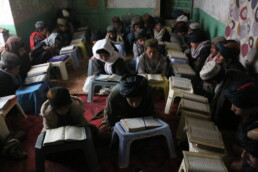An "Education Crisis" in Afghanistan
 December 7, 2023 Evening, Meteor readers, Did y’all see who TIME voted person of the year? Not to sound like a hipster, but she has been my person of the year since 2012 when the spirit first moved me to jump up on a coffee table and jam out to a burned copy of RED my friend gave me. (Thank you, Brittany, for showing me the light all those years ago.)  In today’s newsletter, we learn of a new crisis unfolding in Afghanistan. Plus, a little unsportswomanlike gloating, and our weekend reading list and a special feature on an inspiring young activist. Balancing it all, Shannon Melero  WHAT'S GOING ONLost boys: Since the Taliban’s return to power in 2021, the harrowing conditions faced by women and girls in Afghanistan, including their loss of access to education, have been widely shared. But a new report from Human Rights Watch is shedding light on a new group of victims who may have been overlooked: school-age boys. The report has discovered an “alarming deterioration in boys’ access to education” —what HRW describes as an education crisis that could create a “lost generation.” Before the Taliban’s return, most schoolteachers were women; now that they’re barred from teaching, boys are attending classes led by unqualified male teachers, and in some cases, there are no teachers at all. One student who spoke with the researchers said, “The newly hired teachers have highly aggressive behavior toward the students, so the school environment is full of fear.” The report found that many students have stopped going to school altogether to avoid the sharp uptick in corporal punishment. Another student recounted to HRW that he had been whipped on his feet during a morning assembly and had his head shaved in front of his classmates because his hairstyle was “too Western.” A common thread among all the students interviewed is how deeply they feel the absence of the women who once taught them—including those with specialization in subjects like physics and biology, subjects that are no longer being taught in some schools because of a lack of qualified educators. The long-term effects of the education crisis, coupled with Afghanistan’s current economic crisis, will reverberate for generations. When boys and girls are denied access to education, they are more likely to experience heightened rates of discrimination, poverty, and violence. The future of an entire nation is being determined at this very moment, and unless the Taliban can be convinced to function in their country’s best interests, it will be a dark one indeed. AND:
 MORALES (CENTER) SURROUNDED BY FELLOW SURVIVORS AND SUPPORTERS IN HER YOUTH NETWORK. (PHOTO COURTESY OF ABRIANNA MORALES)
 TRINITY RODMAN STRIKING A WINNING POSE AT TRAINING CAMP. (IMAGE BY BRAD SMITH VIA GETTY IMAGES)  WEEKEND READING 📚
 FOLLOW THE METEOR Thank you for reading The Meteor! Got this from a friend?
|
![]()
To No One's Surprise, Millennials Aren't Looking Forward to Motherhood
NEWSLETTER
If only there was something we could do about that…
By Shannon Melero
Around this time last year, I was waddling around my baby shower, taking pictures, and picking food off people’s plates (pregnant privilege) when a friend of a friend came up to me and whispered, “I hated my baby shower, too. But at least it’s almost over.”
I gave a non-committal smile and pretended I had to use the bathroom. Exchanges like this were a regular occurrence throughout my pregnancy; everyone I talked to projected their own experiences onto mine. Never mind the fact that I actually loved my shower and happily ruined my elaborately secured headpiece by doing the dutty wine in the middle of the dance floor, belly and all—my pregnant body was just a placeholder for the feelings of others that they now felt comfortable voicing.
And what struck me is that so many of those feelings were negative. Horror stories about all of the bad things that would happen to me before, during, and after childbirth. It seemed like not a soul had anything positive to say about motherhood.
It turns out this doom-and-gloom narrative surrounding all things mommy is unique to millennials, as Rachel M. Cohen laid out last week at Vox in the now-viral “How Millennials Learned to Dread Motherhood.” Cohen dissects the many, many ways non-moms have been conditioned to think about motherhood:
“College-educated millennial women considering motherhood — and a growing number from Gen Z too — are now so well-versed in the statistics of modern maternal inequity that we can recite them as if we’d already experienced them ourselves. We can speak authoritatively about the burden of “the mental load” in heterosexual relationships, the chilling costs of child care, the staggering maternal mortality rates for Black women. We can tell you that women spend twice as much time as men on average doing household chores after kids enter the picture, that marriages with kids tend to suffer. We’re so informed, frankly, that we find ourselves feeling less like empowered adults than like grimacing fortune-tellers peering into a crystal ball.”
Add to this the absolute barrage of mommy content that Cohen details, from self-help parenting books to idyllic momfluencers warning millennials about the highs and mostly lows of having a child—and it makes sense that the birth rate in the U.S. is on the decline.

Cohen’s overall thesis wasn’t that millennials hate kids, but that we are being inundated with so much negative information about motherhood that it’s practically in the air we breathe. And she’s right. If I didn’t already have a kid myself and was going off what I read, I’d think it was the worst possible choice I could make in life.
But what I find frustrating about the mountains of think pieces around motherhood is how much time is devoted to the over-intellectualizing of The Decision and its pitfalls rather than mothering itself. It’s the navel-gazing on who-what-when-where-and-why people are deciding to have kids that distracts us from the larger issue: addressing the massive structural hurdles that have been placed in front of mothers for decades.
Consider the lack of affordable childcare, soaring costs of food, diaper shortages, and crumbling social safety nets for children in America. Add to that the absence of post-partum care, unless you pay for it out of pocket—the decision to skip motherhood is practically made for you. But all this constant talk about how hard motherhood can be isn’t giving way to what we as a society can actually do about it. Part of the structural problem is America has such an individualistic culture that we don’t think other people’s children are our problem. Whereas, for example, many Latine cultures emphasize the “village” approach to raising children. (Cohen also gets into how politicians, particularly Republicans, actually weaponized family-first values in such a way that made progressive millennials feel they were falling into a GOP trap if they voiced wanting a family.)
Once I gave birth to the world’s cutest baby (this has been fact-checked), people were notably less interested in having theoretical discussions about my decision to have a child. In their minds, by going through with that choice, I’d already done the hard part; I’d signed up for my miserable mommy fate and must endure it on my own. All that intellectualizing about why I would want to have a baby only to have my experience as a mom, like many other moms, boiled down to internet memes about sleeplessness and clueless partners. It is incredible how moms are so seen and discussed as theoretical figures, but in practice, we are invisible, obscured by our very own creation.

Now that I am a mom, I’ve been asked if motherhood is “worth it.” To that, I can only respond: Worth what? What thing do I hold up as a measuring stick to the experience of being a mom to determine its worth? There’s nothing that comes close, nothing that can really quantify the feeling I get when my kid laughs her screechy laugh. It’s also an incredibly insidious question because what we’re really asking moms is: Is your child’s life worth the money and resources that you’re demanding from the government?
That we spend so much time parsing and studying and surveying why people do or don’t want to have kids would be helpful if it actually went a step further and informed policy. Millennial mom-dread can be an interesting talking point we argue over for the next decade…or we can finally stop asking how to improve mom’s lives and just do the damn thing.
Shannon Melero-Urena
Shannon Melero is a Bronx-born writer on a mission to establish borough supremacy. She covers pop culture, religion, and sports as one of feminism's final frontiers.
32,000 more births
 November 30, 2023 Darling Meteor readers, Exciting news! If you click the button below, you’ll get your first annual Meteor Wrapped highlighting how much time you spent reading, what you clicked, and which Meteor events were your favorite. Just kidding! We don’t jive with creepy algorithms that put all your business out there (as entertaining as it is to see what everyone’s been listening to). In today’s newsletter, we check in with the abortion lawsuit in Texas, see dead things come back to life, and share our long reads for the weekend. Don’t need a Wrapped to know I only listened to Taylor, Shannon Melero  WHAT'S GOING ON32,000 more births: On Tuesday, the Texas Supreme Court heard testimony from some of the 22 plaintiffs in a lawsuit arguing that the medical exceptions in Texas’s abortion ban are too narrow to protect women with complicated or nonviable pregnancies. The testimonies, from women whose lives were threatened by the denial of an abortion, ranged from horrific to unspeakable: last-minute travel plans after heartbreaking ultrasounds; sepsis; purple limbs from severe blood clots; and giving birth to a fetus missing parts of its skull. Writer Jessica Valenti pointed out on Xwitter that when asked by a judge if acrania (the condition that prevents the skull from fully forming) qualifies as an exception to the state’s abortion ban, the lawyer representing Texas admitted she didn’t know what it was. Yet another reason why non-doctors shouldn’t have final say over medical decisions. While some of the lawsuit’s plaintiffs were eventually able to obtain abortions, a new data analysis from the Institute of Labor and Economics sheds light on pregnant people who weren’t. The data estimates that a “significant minority”—between one-fifth and one-fourth—of women living in ban states who may have otherwise gotten an abortion did not get one. That means that in the first six months of this year, 32,000 more people than were expected based on past trends gave birth in those states. One of the authors of the paper says this reflects an “inequality story”: Women in their 20s and Black and Latine women—all of whom tend to be lower-income and are less likely to have the resources to travel—were disproportionately among those who gave birth. Ultimately, this study paints a far broader picture of who is affected by abortion bans than the Texas lawsuit is able to. The stories from the Texas plaintiffs—most of whom are white, married, and wanted to be pregnant before they were faced with medical emergencies—are terrible and dehumanizing, and demand justice. But if you widen the lens, you find a number of invisible victims, who may or may not fit the “good victim” stereotype. People of color are most affected by bans like the one in Texas (where the population is 40% Latine) and yet they remain underrepresented. Perhaps some of those 32,000 pregnant people were also diagnosed with fetal abnormalities—but the rest of them likely would have sought abortions for all kinds of individual reasons. Those reasons don’t matter. The right to bodily autonomy is not conditional; we have to be in it for every last person. AND:
  JUST CLICK THE LINK ABOVE TO GET YOUR UNIQUE SHARE CODE TO SEND TO FRIENDS. IF FIVE OF THEM SIGN UP, WE'LL SEND YOU A METEOR TOTE! ALREADY HAVE A CODE BUT CAN'T FIND IT? NO WORRIES, IT'S WAITING FOR YOU DOWN BELOW. ⬇️
 WEEKEND READING 📚
Correction: An earlier version of this piece stated that the students in Vermont had been killed instead of injured. We regret the error.  FOLLOW THE METEOR Thank you for reading The Meteor! Got this from a friend? Subscribe using their unique share code or snag your own copy, sent Tuesdays and Thursdays.
|
Who gets to be called "child"
 November 28, 2023 Salutations, Meteor readers, If you’re reading this, it’s time to toss out your Thanksgiving leftovers. I’m sure it all still tastes great, but is five-day-old potato salad really worth the risk to your gut health? In today’s newsletter, we look at the media’s coverage of the temporary truce in Gaza, a staggering report out of Puerto Rico, and as much good news as we can muster. Clearing the fridge, Shannon Melero  WHAT'S GOING ONWar of Words: What do you call a 13-year-old taken from their home and held against their will by an armed group? Well, it depends. After more than a month of siege warfare, a humanitarian pause was established between Hamas and the Israeli government. As part of this pause, each group agreed to an exchange of hostages and transport of aid into Gaza, the first positive thing that’s happened in weeks. While Israeli children have been accurately described as “child hostages,” Palestinian children captured by the IDF and held for years without trial are being referred to as “detainees,” “minors,” or “prisoners under the age of 18,” which is a lot of words to avoid saying “children.” (Keep in mind that many of the people Israel released have not been tried or convicted of any crimes and include teenagers who were arrested years ago without formal charges.) As the Gazan activist Bisan asked in a social media post last week, “Are our children less children than theirs?”  A 17-YEAR-OLD RELEASED FROM ISRAELI JAIL REUNITES WITH HIS FAMILY. (PHOTO BY SAEED QAQ/ANADOLU VIA GETTY IMAGES) The choice to use such varying descriptors for children is not unique to the current news cycle. We can see it in the way Black boys routinely face “adultification” in the media: Michael Brown wasn’t just a teenager shot by a cop; he was “no angel.” Children captured at the U.S. southern borders aren’t innocents held and transported against their will; they’re “detained migrant minors.” White children and teens, on the other hand, are often described in terms that elevate their youth and victimhood—sometimes even if they’re the ones committing the crimes. They’re not terrorists; they’re troubled; they’re mentally ill; they’re “volunteers.” It should not need saying: Both Israeli and Palestinian children are victims of horrific violence. No child asks to be born in an oppressed territory or to live under an oppressive government. And all children deserve accurate, thoughtful, and fair reporting from our news institutions. As James Baldwin famously wrote in The Nation in 1980: "The children are always ours, every single one of them, all over the globe; and I am beginning to suspect that whoever is incapable of recognizing this may be incapable of morality." AND:
 TELL ME SOMETHIN’ GOOD
 FOLLOW THE METEOR Thank you for reading The Meteor! Got this from a friend?
|
![]()
The women keeping femicide on the front page
|
No images? Click here Darling Meteor readers, A group of Swifties in Brazil, where Taylor Swift is scheduled to perform on the next leg of the never-ending Eras tour, wants to project her “Junior Jewels” t-shirt onto Rio de Janeiro’s Christ the Redeemer statue. If I were a Christian, I would absolutely jump at this opportunity to have Taylor Swift put Jesus on the map. I mean if she can do it for the NFL…  In today’s newsletter, Mariane Pearl writes about the network of citizen journalists tracking the staggering number of femicides across the globe. Plus more news out of Ohio, a very strange blast from the past, and a special Red Cup Day “celebration.” Shannon Melero  WHAT'S GOING ON

 Femicide on the Front PageMeet the global network of activists and citizen journalists determined to document violenceBY MARIANE PEARL PORTRAIT OF ACTIVIST AND RESEARCHER HELENA SUÁREZ VAL. (IMAGE BY SOLEDAD MORAGA) On a sunny, crisp, fall weekend, Dawn Wilcox sits in front of a computer in her suburban Dallas home with her cat perched on her lap, building her database. She scours news reports and police records for details about Ashli Ehrhardt Wonder, a 29-year-old woman allegedly killed by her estranged husband in Kansas City, Missouri, on September 22, 2023. The details are horrific, down to the fact that the assailant wrote his last name in blood on Wonder's leg. Wilcox, 60, marks Wonder as the 729th known femicide in the United States this year. A couple rows below, #731 is 26-year-old tech founder Pava LaPere, a beloved Baltimore CEO who was named in Forbes’ 30 Under 30 list earlier this year. A man followed her home and strangled her in late September. And LePere and Wonder were far from alone; femicide—the killing of women and girls because of their gender— increased by 24% in the U.S. between 2014 and 2020, according to a 2022 report by the Violence Policy Center. In the United States, often “people think femicide only occurs in Afghanistan and other so-called ‘developing’ countries, but this is happening right here on an unimaginable level,” Wilcox says. “Each death isn’t a cold number or a statistic, but a human being…a woman with hopes and dreams.” A few hundred miles away, north of Little Rock, Arkansas, 52-year-old Rosalind Page is adding an entry to her own grim database. On October 3, Sian Cartagena, an 18-year-old woman whose mother described her as “victim to a domestic abusive relationship” died two days after being shot in Allentown, Pennsylvania. “At least five Black women and girls are killed each day in the U.S.,” says Page, noting that Black women are disproportionately impacted by intimate partner violence and femicide. “This is an epidemic and it’s only getting worse.” Wilcox and Page aren’t professional journalists. They’re both full-time nurses who, driven by passion and frustration, have become investigative reporters in their spare time. Wilcox, a domestic violence survivor, has spent the last seven years building Women Count USA: Femicide Accountability Project, a database that has recorded 12,500 women murdered since 1950. Page, who has spent the last three decades working at a hospital, launched her database, The Black Femicide Prevention Coalition, after she noticed a pattern: More than half of the Black women she treated were victims of male-perpetrated violence. Wilcox and Page are part of an unlinked but growing global army of activists and journalists, from Uruguay to Algeria, who are taking it upon themselves to track femicide, one of the most extreme forms of gender-based violence. Exasperated by what they see as government inaction and inadequate media coverage, they are committed to honoring victims, pushing the news industry to do better, and providing the kind of vital data that can actually catalyze change. “We’re doing this work hoping that it becomes obsolete,” said Helena Suárez Val, who in 2014 started Feminicidio Uruguay, a public database tracking femicide in her country, where gender-based violence is the second most reported crime behind theft. Val has since collaborated with similar women-led data efforts throughout South America through a collective she co-founded called Data Against Femicide. As she describes it: “Our data is our activism…one of the tools that will hopefully bring down the misogynist master’s house.” This series is a collaboration between the Gender, Ethic, and Racial Justice - International program at the Ford Foundation and The Meteor.  MEET US AT THE THEATERWe are thrilled to announce that In Love and Struggle Vol. 3: The Future is Around Us will be live at the Minetta Lane Theatre in New York December 14-16. Come enjoy live performances from Cree Summer, Zainab Johnson, Mahogany L Browne, Amanda Seales, Nona Hendryx and more. Each night promises to be a magical experience with storytelling, music, and comedy.  FOLLOW THE METEOR Thank you for reading The Meteor! Got this from a friend? Subscribe using their unique share code or snag your own copy, sent Tuesdays and Thursdays.
|
![]()
Love, Actually is bad, actually
|
No images? Click here Dear Meteor readers, This past weekend, we had the pleasure of hosting our annual event, Meet the Moment, at the Brooklyn Museum. As we sit in the middle of global crises—regular attacks on our rights, rising antisemitism and Islamophobia, war and conflict—the whole idea of meeting the moment has never felt more crucial. Amidst all this grief, we focused on hope. As Dr. Ayana Elizabeth Johnson said in conversation with Ilana Glazer, “I wake up every day and think, ‘How can I be useful?’… and pace myself with bad news, because it doesn’t change what I need to do.” A lesson to us all. In today’s newsletter, we offer a bit of that bad news, some not-so-bad news, and writer Scarlett Harris’s unsentimental thoughts about the 20th anniversary of Love, Actually. Ready to meet the moment with you, Samhita Mukhopadhyay  WHAT'S GOING ON
 MORE ON “MEET THE MOMENT”At the intersection of advocacy, representation, culture, and politics, we heard from leaders like:  ALLIE PHILLIPS ADDRESSES THE CROWD (PHOTO BY MONNELLE BRITT)
 12-YEAROLD SPORTS JOURNALIST PEPPER PERSLEY (PHOTO BY MONNELLE BRITT)
Our final conversation, between Dr. Ayana Elizabeth Johnson and Ilana Glazer, brought a levity I’ve taken with me, including this tidbit:  ROM-COMS OF CHRISTMAS PASTLove, Actually is Bad, ActuallyTwentieth-anniversary thoughts about the much-memed rom-comBY SCARLETT HARRIS Love, Actually, which celebrated its twentieth anniversary this month, became a classic for its star-studded cast, British sentiment, and Christmas vibes. Over the years, it has inspired endless memes and spoofs. But the bloom has been off the rose for some time now. Sure, plenty of rom-coms don’t hold up when revisited in the stark light of the 2020s—the catfisher’s playbook You’ve Got Mail and the statutory-rapey Never Been Kissed come to mind—and even modern takes like Happiest Season, Sierra Burgess is a Loser, and Marry Me sometimes rely on lazy stereotypes and outdated tropes. Still, when it comes to gender roles and relationship dynamics, Love, Actually is in a cringeworthy class of its own.  The 2003 British anthology rom-com, directed by Richard Curtis, follows an assortment of lovelorn Brits making the worst relationship decisions imaginable. Everyone, take a deep breath: Harry (Alan Rickman) is cheating on his perfectly nice wife Karen (Emma Thompson) with his vampy assistant, Mia (Heike Makatsch). Mark (Andrew Lincoln) is in love with Juliet (Kiera Knightly), the new bride of his best friend Peter (Chiwetel Ejiofor, one of only two people of color in the entire cast). The recently-jilted Jamie (Colin Firth) falls in love with his Portuguese housekeeper Aurélia (Lúcia Moniz), with whom he can’t communicate due to their language barrier. And the Prime Minister (Hugh Grant) engages in sexual misconduct at his workplace when he pursues his young, naive aide, Natalie (Martine McCutcheon). This behavior looks saintly compared to his professional rival, the United States President (Billy Bob Thornton, doing his best Bill Clinton), who sexually assaults Natalie later in the movie. To quote the Black Eyed Peas: Where is the love? Many of these supposedly romantic scenarios occur in the workplace, but even if they don’t, little airtime is given to the power dynamics involved. Whoever decided it was dreamy for Mark to show up at Peter’s house to accost his wife with placards spelling out his true feelings was seriously disturbed. Ditto to Jamie proposing to a domestic worker he employs without ever having exchanged a word. The least problematic relationship could have been cold, rigid Harry cheating on long-suffering Karen were it not for Harry’s sketchy workplace romance. When the female characters aren’t getting fat-shamed, they’re being objectified. Most of their storylines center on how hot they are, or aren’t. Jamie falls for Aurelia based on physicality alone. There’s not much to Mia besides luring Harry to cheat through her feminine wiles. Since Mark spends the movie avoiding Juliet, one must conclude that he’s primarily drawn to her looks. The same goes for elementary school student Sam (Thomas Brodie-Sangster), who’s apparently had so little interaction with his crush that he’s surprised she knows his name. Sam’s stepfather, Daniel (Liam Neeson), is dating his own crush, played by thee Claudia Schiffer. (Why wouldn’t he be, when every over-50 and/or schlubby guy in Love, Actually gets the girl?) Laura Linney’s Sarah pining after Rodrigo Santoro’s Karl is one of the only connections that gives a woman agency and a sense of desire—though, it must be said, they’re still colleagues. The movie’s most egalitarian relationship is that of two body doubles filming a sex scene, John (Martin Freeman) and Judy (Joanna Page). I’m guessing their scenes are an excuse to incorporate some nudity and sex gags amidst a cast with the least sexual chemistry in rom-com history. Still, the actors’ meet-cute is surprisingly effective. Even while naked in front of the cameras, they talk to each other like respectful, normal human beings. If only the rest of the movie could have taken a cue from their dynamic. Watching Love, Actually now seems particularly jarring given the evolution of the romantic comedy over the last 20 years, both in its depiction of relationships and its stars. There’s still a long way to go, but rom-coms like Rye Lane; Red, White & Royal Blue; and Good Luck To You, Leo Grande are paving the way Love, Actually wishes it could have. If you’re itching for some simple Christmance spirit this year, throw on a Lifetime or Netflix movie instead of Love, Actually. It might be just as problematic, but at least it won’t be pretending to be something it’s not.  Scarlett Harris is a culture critic, author of A Diva Was a Female Version of a Wrestler: An Abbreviated Herstory of World Wrestling Entertainment, and editor of The Women Of Jenji Kohan.  FOLLOW THE METEOR Thank you for reading The Meteor! Got this from a friend? Subscribe using their unique share code or sign up for your own copy, sent Tuesdays and Thursdays.
|
![]()
When pregnancy is criminalized
|
Dear Meteor readers, We're coming to you today with a remarkable story. Lauren Smith is a mother of three in South Carolina now facing up to ten years in prison—for having smoked marijuana to alleviate her symptoms while pregnant with her youngest child. Smith's case sounds nightmarish, but it's not uncommon in post-Roe America, where fetal personhood laws have enabled prosecutors to more easily penalize pregnant people for their actions. Over the last five months, journalist Neda Toloui-Semnani has investigated this new legal environment, its implications, and Smith’s fight to keep her family together.  UNITED STATES OF ABORTION“I Didn’t Feel Like a Mother. I Felt Like a Criminal.”BY NEDA TOLOUI-SEMNANI GREENVILLE, SOUTH CAROLINA Lauren Smith thought she knew what to expect as she was rushed into the operating room. At 26, it was her third cesarean section. “I don’t remember much before or after because everything moved so fast,” she says. “I remember crying. I remember being cold and being wheeled in there, and then, laying back, and then, I remember looking at the clock. It was at an angle.” The surgeon cut her open and pulled out a squirming infant, a baby girl Smith would name Audrey. Delivered a month early, she was a strong, healthy, kicking-screaming, six-pound, five-ounce newborn. Smith thought she knew what would come next. But like a character in a Kafka tale, her world had shifted while she slept. The same day she delivered—February 18, 2019—a urine drug screen confirmed that she had used marijuana during her pregnancy. The next morning, Audrey’s meconium, the first stools voided by an infant, tested positive for THC, a compound found in marijuana. Three nights later, as Smith, who is Black, prepared to leave the hospital, a case worker and a lawyer from the Department of Social Services told her that because she had tested positive for THC, she could not take her new baby home. That’s when she started to scream. She was alone in the hospital room, the phone to her ear, sutures across her abdomen. She kept asking for someone—anyone—to explain what was happening. “I just remember nobody was there to speak for me,” Smith recalls. “I couldn’t even really speak for myself.” “I didn’t feel like a mother,” she says, “or a person who just had a baby. I didn’t feel like a victim. I felt like a criminal.” She said goodbye to her baby that night. Six months later, Smith would be arrested and charged with felony child neglect for using marijuana while she was pregnant with Audrey—a crime that, in South Carolina, carries a penalty of up to 10 years in prison. Through a complex sequence of events, the charge also led to her losing custody of her second child, Aiden, for two years. Smith’s trial has been pushed back again and again; as of publication, it is set for February 19, 2024.  FOLLOW THE METEOR Thank you for reading The Meteor! Got this from a friend? Sign up for your own copy, sent Tuesdays and Thursdays.
|
![]()
Why Do Men Love Telling Women to Have Babies?
|
No images? Click here  November 2, 2023 Hey, Meteor readers, Next Tuesday is Election Day! If you haven’t already, make sure you know your polling place and have a plan to vote, even if the lines are massive. We cannot say it enough: Local elections matter. In today’s newsletter we’re talking about babies, mourning two feminist leaders, and sharing some weekend reading. Researching school board candidates, Shannon Melero  WHAT'S GOING ONThe birth economy: During the opening of China’s National Women’s Congress last month, President Xi Jinping laid out a comprehensive and innovative plan for reviving China’s economy: Women, please get married and have babies. “We should actively foster a new type of marriage and childbearing culture,” he said, making no mention of women who work outside the home (and, presumably, have something to contribute to the economy themselves). In the face of economic decline and a slowly shrinking population, Xi has turned to a well-worn reactionary directive currently enjoying a revival in the U.S., too: ask women to stay home and raise the next generation of workers rather than find those women jobs and childcare. Despite its name, the Women’s Congress is not a legislative body but an event that occurs every five years to discuss women’s issues. And who gets invited to this prestigious event? China’s predominantly male National People’s Congress, comprised of delegates from various regions. (Their gender ratio is better than the Politboro, Xi’s executive policymaking body, where there are exactly zero women.) During his speech, Xi urged his audience to “tell good stories about family traditions and guide women to play their unique role in carrying forward the traditional virtues of the Chinese nation.” What a poetic way to tell half the population to shut up about their careers and reproduce.  PRESIDENT XI JINPING AT THE OPENING OF THE 13TH NATIONAL WOMEN'S CONGRESS. (IMAGE BY XIE HUANCHI VIA GETTY IMAGES) Speaking of babies: Meanwhile, over in America, conservatives who are badgering women to have babies are coming across more tone-deaf than usual, considering that those babies are dying at a higher rate than they have in 20 years. In the United States, which has the highest infant and maternal mortality rates of any high-income country in the world, deaths before a child’s first birthday have significantly increased this year, per a new report by the National Center for Health Statistics. For every 1,000 births in America last year, 5.6 babies died within their first months of life. While Black infants still have the highest mortality rate in the country, the year-over-year increase was sharpest for Native and white communities. Experts can’t agree on what’s contributing to the rise in deaths, but two possible factors are the COVID pandemic and the fall of Roe, both of which fundamentally changed how Americans sought out and received medical care. Dr. Tracey Wilkinson, an associate professor of pediatrics in Indiana, told NBC News, “Anybody who’s in the reproductive health space could and did warn that this is the type of data we were going to start seeing when we took away the federal protections to abortion access.” AND:
MAY THEIR MEMORY BE A BLESSING
 WE'RE GIVING AWAY SOMETHING EXTRA SPECIAL THIS MONTH! FOR EVERY FRIEND THAT SIGNS UP FOR THIS NEWSLETTER USING YOUR ▶️ UNIQUE SHARE CODE ◀️ YOU'LL BE ENTERED INTO A DRAWING TO WIN TWO FREE TICKETS TO MEET THE MOMENT AT THE BROOKLYN MUSEUM DON'T HAVE A CODE? GET ONE HERE!  WEEKEND READING 📚On grief: The videos and photos of the carnage in Gaza are crushing to look at. But as my former colleague Samer Kalaf writes, “Sharing these videos feels like the only way to acknowledge these killings in a moment where many perceive them only as numbers in a news article.” (Defector) On hindsight: Rep. Barbara Lee famously voted against what would later become the ‘00s’ endless war on terror. She offers her thoughts on the value of restraint in the face of devastating violence. (Washington Post) On the happiest place on Earth: Writer Alana Levinson spends a spooky, surreal day at Disneyland with former Playboy bunny-turned-author and TikTok star Holly Madison. (Bustle)  FOLLOW THE METEOR Thank you for reading The Meteor! Got this from a friend?
|
![]()
A purge in Ohio
|
No images? Click here  October 31, 2023 Happy Halloween, Meteor readers, I’ve never been much of a costume girlie. I prefer Dia de los Muertos, which is celebrated in the days after Halloween. I love the idea of making the veil between the living and those who’ve crossed over a bit thinner. So remember to put out a candle and a little treat for your loved ones or any other spirits you’re welcoming. And if there are some ghosts you’re trying to avoid? Burn a little sage, name the ghost, and say aloud that they aren’t welcome. You can thank me later.  In today’s newsletter, we take a look at GOP tomfoolery in Ohio, the arrest of an Iranian hero, and an engagement announcement. Summoning spirits, Shannon Melero  WHAT'S GOING ONThe Purge: Nearly 27,000 people just lost the ability to vote in Ohio. How does that happen, exactly? It’s routine to maintain the list of registered voters by removing those who change their names or have moved. But in the last decade, since a 2013 Supreme Court case gutted the Voting Rights Act of 1965, irresponsible purges are on the rise—and often come with a political motivation. This Ohio purge is particularly suspect because of its timing and, more to the point, because of what's on the ballot next week. Before they’re removed, voters are required to receive notification about the pending risk. But since those notifications can easily slip under the radar, it’s customary not to carry out a purge so close to an election. The fact that Ohio Secretary of State Frank LaRose scheduled this purge less than a week before Election Day has raised suspicions among his colleagues—especially because, just this August, LaRose delayed a purge until after a special election that included a GOP-backed measure meant to make it tougher to pass constitutional amendments. Which brings us to the heart of the issue: What exactly is LaRose preventing some Ohioans from voting on next week? A few things, but the big fish on the ballot is Issue 1, a measure that would amend the state constitution and “prevent the state from banning access to abortion, contraception, miscarriage care and other reproductive decisions.” LaRose knows the odds are stacked against him. Similar elections putting abortion on the ballot have resulted in a spate of pro-choice victories, even in conservative states like Kansas, Kentucky, and Montana. The GOP is fully aware that the majority of Americans support abortion access, and voter suppression is the only way to get around that inconvenient fact. (For a party that claims to hate government overreach, they’re giving extreme reach.) If Issue 1 does go on to fail by less than 27,000 votes next Tuesday, the purge may have been successful, and LaRose will have laid out a blueprint for other anti-abortion Secretaries of State looking to change the outcome of elections. These kinds of tactics are a reminder of just how much extremists rely on sowing confusion and making voting as difficult as possible. Don’t let them. AND:
 Demonstrators rally outside the U.S. Capitol demanding a cease fire in Gaza on October 18. (Image by Chip Somodevilla via Getty Images)
 WE'RE GIVING AWAY SOMETHING EXTRA SPECIAL THIS MONTH! FOR EVERY FRIEND THAT SIGNS UP FOR THIS NEWSLETTER USING YOUR UNIQUE SHARE CODE BELOW YOU'LL BE ENTERED INTO A DRAWING TO WIN TWO FREE TICKETS TO MEET THE MOMENT AT THE BROOKLYN MUSEUM DON'T HAVE A CODE? GET ONE HERE!  ICYMIDidn’t make it to Work Shift? We’ve got you covered! Enjoy this panel discussion featuring two HR execs who are letting us non-HR folk know what goes on behind the scenes—and how they're putting the “human” back into human resources. SPONSORED BY:  FOLLOW THE METEOR Thank you for reading The Meteor! Got this from a friend?
|
![]()
"Why do people do this?"
|
No images? Click here Good evening, Meteor readers, As we amble our way towards November (it’s RIGHT there), I am thinking of entering a season of gratitude. With the news awash with tragedy—the mass shooting in Maine, the devastation of Hurricane Otis in Acapulco, and the continuing crises in Gaza and Israel—I am more aware than ever of how often I take for granted life’s small pleasant surprises. Let’s all choose to be better about that. In today’s newsletter we look at the inadequate gun laws that made way for the Maine shooting, share our weekend reading, and hear from one of the women who first blew the whistle on AI’s biased ways. With love, Shannon Melero  WHAT'S GOING ON THE BAR WHERE PART OF WEDNESDAY'S MASS SHOOTING TOOK PLACE. (IMAGE BY SCOTT EISEN VIA GETTY IMAGES) Lewiston, Maine: It started in a bowling alley on Wednesday night. Officials say that around 7 p.m., a gunman entered Sparetime Recreation and started firing rounds from an “assault-style weapon.” He eventually fled the scene and drove to a local bar to continue the shooting spree. So far, 18 people have been confirmed dead, with 13 injured. One of the wounded, a 10-year-old named Zoey, who was there with her youth bowling league, told a local news station, “I had never thought I’d grow up and get a bullet in my leg. And it’s just like, why? Why do people do this?” The simplest answer to Zoey’s question is: because they can. The suspected gunman, Robert Card, is a firearms instructor and a U.S. Army Reservist. As early as this summer, military officials had “concerns” about Card, and later reported him for erratic behavior while supporting summer training for cadets at West Point. Card was later admitted to a mental health facility, where he claimed he’d been “hearing voices and threats to shoot up” West Point. Despite all of this, Card still had access to firearms. That’s because in Maine—where gun laws are some of the most obscenely lax in the country—just about anyone can legally acquire a firearm. There are weak background check laws, no waiting periods, and no red flag laws, which prohibit gun purchases or possession for anybody who shows signs of being a threat to themselves or others. (Hearing voices and threats to shoot up West Point would count.) Not only that, Maine has had a “permitless carry law” since 2015. This means that any person over the age of 21 “or at least 18 and active duty or honorably discharged military” who owns a gun can carry “loaded, concealed handguns in public without a permit or background checks.” It should not take a mass shooting to enact the most basic gun safety laws. It’s too late for the 18 victims and their families, but it isn’t too late for Zoey, or the rest of us. You can learn more about safety initiatives in Maine from The Maine Gun Safety Coalition and check the laws in your state at Everytown for Gun Safety. AND:
 “The Past Dwells in our Datasets”Can AI ever be unbiased? MIT scholar Dr. Joy Buolamwini has some answersBY REBECCA CARROLL  (IMAGE BY PARAS GRIFFIN VIA GETTY IMAGES) In the celebrated Steven Spielberg movie A.I., set in the 22nd century, scientists create an android boy capable of experiencing human emotions. The film (and its all-white cast) try hard to convince us that at its best, artificial intelligence can learn to love. That was 2001. More than 20 years later, we’re discovering that AI—which now mostly takes the form of computer programs rather than robots—often actually reflects real people’s worst biases. And those embedded prejudices are doing a lot of harm, argues computer scientist, digital activist, and “poet of code” Dr. Joy Buolamwini in her new book, Unmasking AI: My Mission to Protect What is Human in the World. Born in Edmonton, Canada, Dr. Buolamwini spent her early years in Ghana before moving with her artist mother and scientist father to Mississippi when she was four. Just five years later, she saw an MIT-made robot called Kismet on a PBS science program—and decided on the spot that she was going to attend MIT to study robotics. But, once at MIT, she quickly realized her calling was much bigger. As she learned about the ways racial, gender and ableist biases had crept into facial recognition technology, she launched the Algorithmic Justice League, an organization that uses art and policy to advocate for equitable AI systems. I talked to Dr. Buolamwini about not just the harm but the potential of AI. Rebecca Carroll: You write that AI developers promise that AI will “overcome human limitations”—what does that mean exactly? Dr. Joy Buolamwini: AI is presented as enabling humans to be more efficient, more productive, and help overcome human limitations. For example, some AI tools for hiring have been presented as an alternative to human decision-makers who we know can be biased. The problem is AI tools are often created with datasets that reflect past decisions. So AI tools trained on past hiring decisions will reflect the preference and prejudice of the past and make them into current technologies. Amazon found this out when it attempted to make a hiring tool that was shown to discriminate against women. They ended up getting rid of the tool because even after they tried to address the bias, it still favored men. I think it is easy to assume technology will be more neutral than human because technical systems are mathematically based, but it is important to remember that the past dwells in our datasets. You talk in the book about the “arbiters of ground truth”—the idea that data or statistics offered through empirical evidence is the only real truth. How does AI complicate that view? The more I do work on AI, the more I see the importance of storytelling. [One’s] lived experience matters. As a graduate student, I was reading about so many AI advances, yet I found myself coding in a white mask to have a computer see my face. I recorded that experience as something I call a counter-demo. Like a counter-narrative, a counter-demo captures an experience that challenges master narratives of who or what is considered normal or worthy, and in this case master narratives about technological advances. My spoken word poem, “AI, Ain’t I a Woman?”, which is also a test of various AI systems, contains many counter-demos of tech companies failing [to identify] the faces of iconic women of color. It challenges the narrative of tech superiority when we see AI failing [to recognize] the faces of Oprah Winfrey, Michele Obama, Serena Williams, and more. I smiled when I read about your first meeting with Timnit Gebru, where you noted that you both wore your hair natural—itself the subject of centuries-long racial profiling and discrimination. Are there specific policies you’re seeking to put into place to help fight against “the coded gaze”? I dropped a few hair references throughout the book, and I am so glad you noticed! I think governments around the world can learn from the EU AI act, which puts a specific ban on the live use of facial recognition technologies in public places. We can also stop police from using facial recognition for investigative leads, as this dangerous use of AI has already led to false arrests, including the arrest of Porcha Woodruff. AI-powered facial recognition misidentification led to her false arrest for carjacking by the Detroit police department. She was eight months pregnant sitting in a holding cell and having contractions. Three years before Porcha’s arrest, Robert Williams was falsely arrested for theft in front of his two young daughters by the same Detroit police department. Despite ample evidence of racial bias in facial recognition technologies, we still live in a world where preventable AI discrimination is allowed. The excoded (those harmed by AI) include even more people falsely arrested due to AI, like Michael Oliver, Nijeer Parks, Randal Reid, and others whose names may never make headlines, but whose lives matter all the same. You call yourself “the poet of code”—is that a nod to the fact that you are, as you share in the book, the daughter of art and science? Absolutely. Growing up, I saw art and science as companions just like my parents. I also see the role of a poet as showing us perspectives that may be marginalized, ignored, or largely unseen. In my poetic work with evocative audits, I use the spoken and written word to humanize AI harms. Poetry takes me to places research papers cannot go. When you were at MIT, you took a class with the Harvard professor Karen Brennan, who posed the question to you and the other students: “What will you do with your privilege?” How would you answer that same question today? I answer it by using my platform to give voice to feelings and perspectives that might otherwise be suppressed. Here is a recent poem I wrote called Angels Awake, on recent man-made and natural disasters: Heart aching, tears breaking, cycles of pain continue. Spine snapped; hope broke... The earth trembling too. Geography and circumstance shaping the fate of precious souls. Today, I walked through beautiful gardens and sat in chairs of opportunity. My life blossoming as the petals of others fade. How can I not be compelled to use every privilege given to offer healing to deepening wounds? Yet, where do we start when the tsunami of history overwhelms? Seismic shifts are centuries in the making. As the night carries on, I remain awake and agitated, grateful to at least be alive to take another breath… A gift lost by many others far too soon. The aftershocks are coming. Where be our better angels now? This interview has been slightly edited and condensed for clarity.  Rebecca Carroll is a writer, cultural critic, and podcast creator/host. Her writing has been published widely, and she is the author of several books, including her recent memoir, Surviving the White Gaze. Rebecca is Editor at Large for The Meteor.  WEEKEND READS 📚On the river and the sea: A slogan of Palestinian freedom is once again under fire for potentially being antisemitic despite many, including this scholar in 2018, explaining its origins. (Forward) On romance: Who would have thought the savior of Bachelor Nation would be this guy? (Vulture) On TV: Not in the mood to read? It happens. The HBO documentary No Accident, which follows a lawsuit brought by those injured while counter-protesting the 2017 “Unite the Right” rally in Charlottesville, is both riveting and informative.  FOLLOW THE METEOR Thank you for reading The Meteor! Got this from a friend? Subscribe using their unique share code or sign up for your own copy, sent Tuesdays and Thursdays.
|
![]()

























